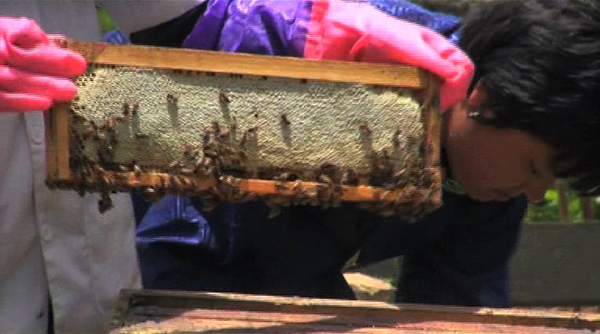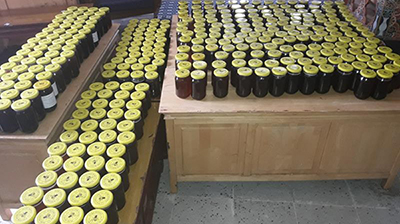 The people of Phobji Gewog in Wangdue Phodrang started beekeeping business and are expecting to fetch a good income from this year. Bee farmers feel the business is much easier than their potato business after bees begin to produce a good amount of honey now.
The people of Phobji Gewog in Wangdue Phodrang started beekeeping business and are expecting to fetch a good income from this year. Bee farmers feel the business is much easier than their potato business after bees begin to produce a good amount of honey now.
“It’s easy to do the beekeeping work as it does not require any extensive care. We have to check it only once in a week. It’s far better than potato cultivation works. Even it does not require a wide space to do this work. For instance, I have four beekeeping boxes within 10 decimal of land and I am expecting to fetch around Nu 60,000 to Nu 70,000 from these four boxes within two months,” said Sangay Dorji, the tshogpa of Damchhoe_Gangphel chiwog in Phobji Gewog, Wangdue Phodrang.
 Some of the bee farmers have started extracting honey from the honeycombs. The extraction is done organically without any adulteration and people believe that it has some certain level of medicinal values. As per the international experts, honey is also known to be a source of riboflavin/vitamin B6.
Some of the bee farmers have started extracting honey from the honeycombs. The extraction is done organically without any adulteration and people believe that it has some certain level of medicinal values. As per the international experts, honey is also known to be a source of riboflavin/vitamin B6.
Riboflavin is a vitamin that is needed for growth and overall good health. It helps the body break down carbohydrates, proteins and fats to produce energy, and it allows oxygen to be used by the body.
“I am doing this beekeeping works for the first time and I have already extracted two and a half boxes yesterday. I got around 47 bottles of honey and its only three months since I began the work. I still have six boxes at home, and I expect to get about 100 bottles of honey. And if it fetches around Nu 500 per bottle, it is for sure that I will get Nu 50,000,” added Sati, the Mangmi of Phobji Gewog, WangduePhodrang.
The Phobji-Gangtey Rangzhin Sebjam Detshen has currently eight members and all of them have almost got ready to harvest their honey. The members have at least eight hives of beekeeping at their respective houses and are excited to see the outcome of their new project. Some members say they will increase the numbers of beekeeping hives if this business goes successfully.
“I am expecting to recover the amount that I have spent while I joined in as a member. I expect to have a good income from this business. I would like to encourage others to do the same. I am also expecting to achieve self-sufficiency through this business,” said Gyeltshen, the tshogpa of Drangpa-Pangsar chiwog from the same gewog.
According to the Dzongkhag Livestock Officer, initially, the group was introduced jointly for both Phobji and Gangtey Gewog in 2017 and had fifteen members, but got decreased because of farmers losing hives due to chemicals used in the potato fields. He says bees are dying when they collect nectar from the chemical infested-potato flowers. Today, members are only from the Phobji Gewog.
“The locals have been using too much chemicals in their potato fields. We learnt that the bees are dying because they collect nectar from flowers, any flowers including the potato flowers. So, we the concerned officials are jointly creating awareness on this issue and urging the locals to minimize the usage of such chemicals since it’s not only affecting the crops but also bees in the communities as well,” Ugyen, the Dzongkhag Livestock Officer of Wangdue Phodrang, said.
He says the beekeeping activity was initiated to generate cash income and to boost agriculture crop production for the farmers. The members decided to harvest the bees only once in a year since bees do not get much honey during the winter. They feed sugar in winter when everything gets dried.
The Livestock officer also says that people are reluctant to come forward for this business by possessing the wrong notion of committing sin. But he says it’s never true. As per the officials, beekeeping business would not only benefit farmers for cash income but also help the crops to enhance its yield and quality by the process of pollination.
“I would strongly oppose this concept. There won’t be any sin for doing beekeeping business since it has a perfect method to handle it. Queen bees are staying in the lower box while only honey and the wax forms on the upper level of the boxes. So, there is no way that the bees and honey can get mixed with each other. Moreover, they handle it gently without even killing a single bee,” he added.
The Phobji-Gangtey Rangzhin Sebjam Detshen was established by spending over Nu 800,000 in total by the government. As per the Annual Performance Agreement of the dzongkhag, the livestock sector has the mandate to produce local pure natural honey and help farmers to generate cash income. Today, the dzongkhag has bee farmers in Phobjikha, Rukubji, Gaselo, Phangyuel and Rubisa.









